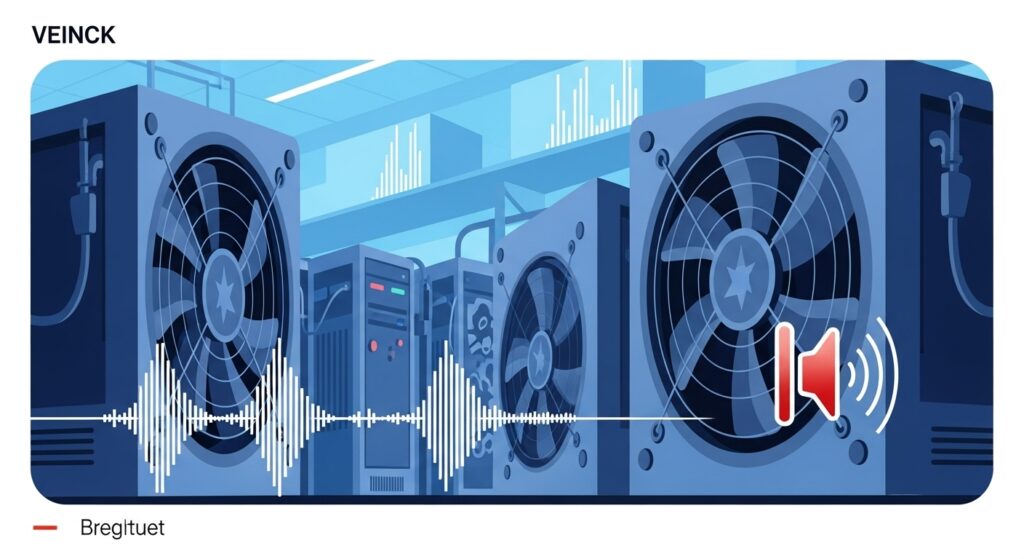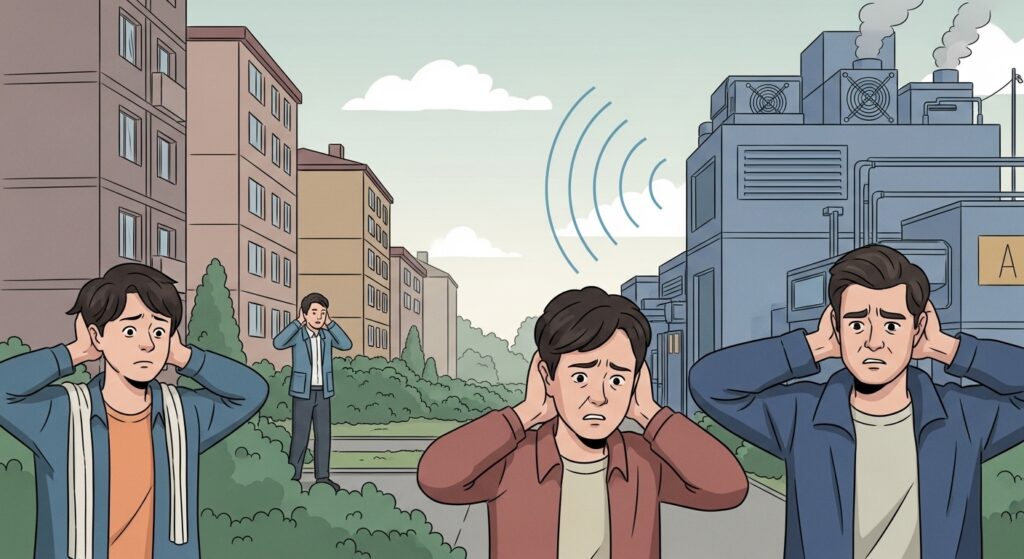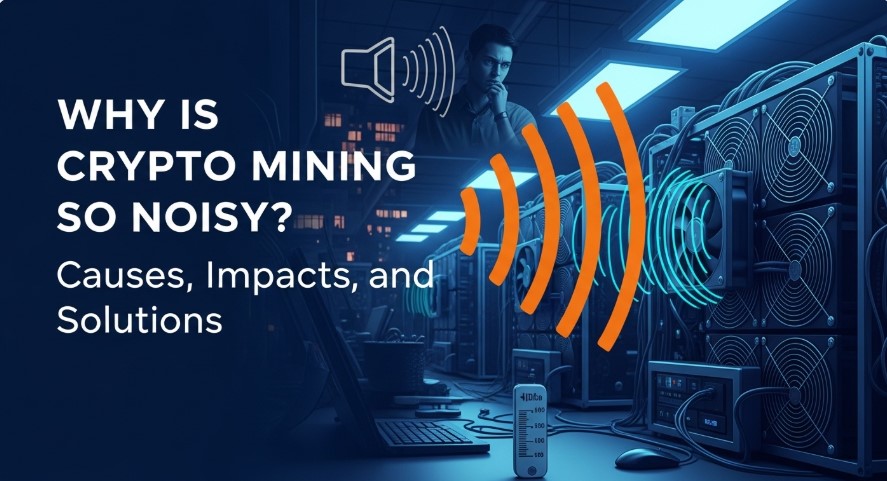Crypto mining, the process of validating transactions on blockchain networks like Bitcoin, requires powerful computers that run 24/7. These computers generate a lot of heat, which needs to be managed to prevent damage. This is where the noise comes in—large fans and cooling systems are used to keep the machines cool, and they can be very loud. In this post, we’ll explain why crypto mining is noisy, how it affects communities, and solutions to reduce the noise.
What Causes Noise in Crypto Mining?
Crypto mining noise comes from the hardware and cooling systems used to keep machines running. Here are the main reasons mining is loud:
- Cooling Fans: Mining rigs use high-speed fans to cool down the intense heat from constant operation. These fans can produce 80–100 decibels, similar to a lawnmower or vacuum cleaner.
- Hardware Vibrations: ASIC miners and GPUs, the main tools for mining, create vibrations and electrical hums as they work at high speeds. This adds to the noise, often reaching 70–90 decibels.
- Aging Equipment: Older mining hardware can get noisier as fans and components wear out over time.
- Large-Scale Operations: Industrial mining farms use extra cooling systems, like air conditioners, which increase noise levels. Multiple machines running together amplify the sound.
| Cause | Description | Noise Level (dB) |
|---|---|---|
| Cooling Fans | High-speed fans to prevent overheating | 80–100 |
| Hardware Vibration | Vibrations and hums from ASICs and GPUs | 70–90 |
| Aging Equipment | Worn-out components increase noise over time | Varies |
| Industrial Cooling | Large-scale cooling systems in mining farms | 90–100 |

How Does Mining Noise Affect Communities?
The constant noise from crypto mining can disrupt nearby residents and cause serious issues. Here’s how:
- Health Problems: Prolonged exposure to noise above 70 decibels can lead to hearing loss, stress, sleep issues, and heart problems. For example, residents in Granbury, Texas, reported migraines and hearing loss due to a nearby Bitcoin mine in 2024.
- Community Tension: The noise, often compared to a jet engine or highway, disturbs daily life. In Arkansas, residents sued a mining operation in 2024 over constant buzzing sounds.
- Legal Disputes: Noise complaints have led to lawsuits. In October 2024, Granbury residents sued Marathon Digital Holdings, claiming the mine’s noise caused health issues. Similarly, a Michigan school sued a mining facility in 2025 for disrupting classes.
- Wildlife Impact: Loud mining operations can scare away animals. Residents in Murphy, North Carolina, noticed fewer birds near a mine in 2023.

Solutions to Reduce Crypto Mining Noise
Miners can take steps to make their setups quieter without losing efficiency. Here are practical solutions:
- Soundproofing: Acoustic foam, soundproof boards, or enclosures like Upstream Data’s Black Box can cut noise by up to 50%. These materials absorb sound and prevent it from spreading.
- Liquid Cooling: Immersion or liquid cooling systems submerge hardware in a cooling fluid, eliminating noisy fans. These systems are much quieter and effective.
- Quieter Fans: Replacing standard fans with low-noise options, like Noctua fans, can reduce noise by 10–25 decibels. For example, a 2021 test showed a Noctua fan cutting noise from 78 dB to 53 dB.
- Relocation: Moving mining setups to remote areas or basements reduces disturbance to neighbors. Cloud mining services are another option to avoid residential noise issues.
- Regulatory Compliance: Miners can work with local governments to meet noise ordinances. Some areas, like Arkansas, require mines to stay 2,000 feet from homes.
For more tips on managing crypto setups, check out our post on How to Create Your Own Cryptocurrency.
Recent Developments in Crypto Mining Noise
The noise issue continues to spark debate as crypto mining grows. Here are recent updates as of July 2025:
- Lawsuits Increase: In May 2025, a Michigan school sued a mining operation for constant noise disrupting classes. Similar cases have emerged in Texas and Arkansas.
- Political Tensions: Former President Donald Trump’s support for crypto, including his son’s America Bitcoin project, has raised concerns about more mining operations and noise. Rural communities worry about increased disruption.
- Community Pushback: Residents in Granbury, Texas, reported noise levels up to 103 decibels in 2024, leading to lawsuits and health complaints. Over 800 locals signed a petition against the noise.
People Also Ask
Here are answers to common questions about crypto mining noise, based on Google’s “People Also Ask” section:
- How loud is crypto mining? A single mining rig produces 70–90 decibels, while large operations can hit 100 decibels, like a lawnmower or jet engine.
- Is crypto mining noise harmful? Yes, noise above 70 decibels can cause hearing loss, stress, and heart issues with prolonged exposure.
- How can miners reduce noise? Use soundproof enclosures, liquid cooling, quieter fans, or move setups to remote areas.
- Are there noise regulations for mining? Some areas have ordinances, like Arkansas’ 2,000-foot distance rule from homes or Texas’ 85-decibel limit.
Conclusion
Crypto mining is noisy because of high-speed cooling fans, hardware vibrations, and large-scale operations. This noise can harm communities, causing health issues and sparking lawsuits. Solutions like soundproofing, liquid cooling, and relocating mines can help. As crypto grows, miners must balance profitability with community well-being to avoid conflicts. For more crypto insights, read our posts on Will Crypto Recover? and Top Companies Accepting Cryptocurrency.

